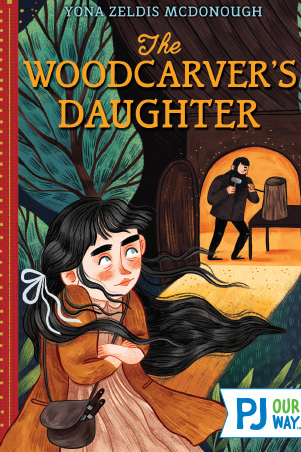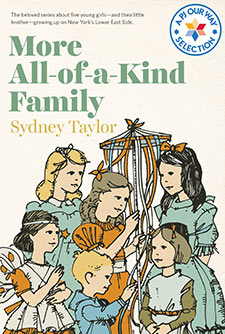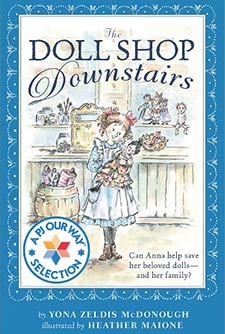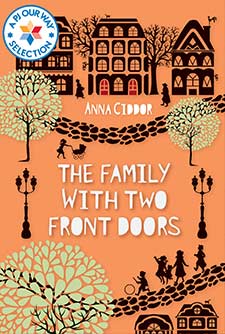The Woodcarver's Daughter
12-year-old Batya wants nothing more than to become a woodcarver like her father, but she’s not allowed to because she’s a girl! Will things be any different for Batya in America?
Average Rating
( hint: Login to leave a review! )
127 Reviews
Leave Review
What the Book Is About
Jewish Content & Values
Positive Role Models
Content Advisory
Talk It Over
More for You
What the Book Is About
It’s 1915, and 12-year-old Batya lives with her family in a small village in Russia. Batya wants nothing more than to be a woodworker like her beloved father, but girls aren’t allowed to join the Woodworker’s Guild. After the woodshop is burned down in a pogrom, Papa decides it’s time to move to America. The move isn’t easy; little Sarah fell ill on the journey and lost her hearing, Batya doesn't like school, and Papa and Mama are struggling to make ends meet. When Batya skips school one day, she discovers the carousel on Coney Island, as well as the shop where the horses are carved. One day Batya discovers the carousel on Coney Island, as well as the shop where the wooden horses are made. Can Batya convince the workers and her father to let her follow her dream?
Jewish Content & Values
-
Batya and her family are Jewish, and they celebrate Shabbat and the High Holidays together.
-
The family speaks Yiddish, and Batya feels comfortable greeting the woodworkers on Coney Island because she hears them speak Yiddish.
-
Papa is a woodcarver who made the Torah ark, bimah (a raised platform in the front of the sanctuary), and benches for their synagogue in Russia.
Positive Role Models
-
Batya is a resourceful, resilient girl who doesn’t give up on her dream of becoming a woodcarver while also helping her family, especially her little sister who lost her hearing on the boat ride to America.
-
Batya’s family, including her parents and siblings, are hardworking, loving, and supportive of each other.
-
Batya’s teacher in the United States, Miss Flannery, is welcoming and supportive of Batya, reaches out to her family when Batya doesn’t come to school, and enrolls little Sarah in a class for deaf children.
Content Advisory
A pogrom in the family’s village in Russia destroys the shop where Papa works and leaves his boss injured, but the description is not graphic. Four-year-old Sarah comes down with a high fever on the boat to America and is left deaf as a result.
Talk It Over
When Batya and her family are entering the United States, the immigration officer has a hard time spelling their last name, Breittelmann, so he changes it to Bright. What do you think about this? Would you change your last name if you could? If so, what would you change it to?
More for You
Professional woodcarvers were among the thousands of Jews who emigrated to the United States from Eastern Europe in the late 19th and early 20th century. In their home countries, these artisans designed and created elaborately carved Torah arks, often guarded by mystical and realistic creatures. Many of these woodcarvers continued to work in synagogues in the United States, while others were hired to carve for the rides on Coney Island, including the famous carousel. According to Professor Murray Zimiles of Purchase College, the creations of Jewish woodworkers “revolutionized the level of artistry associated with American carousels.”
What the Book Is About
What the Book Is About
It’s 1915, and 12-year-old Batya lives with her family in a small village in Russia. Batya wants nothing more than to be a woodworker like her beloved father, but girls aren’t allowed to join the Woodworker’s Guild. After the woodshop is burned down in a pogrom, Papa decides it’s time to move to America. The move isn’t easy; little Sarah fell ill on the journey and lost her hearing, Batya doesn't like school, and Papa and Mama are struggling to make ends meet. When Batya skips school one day, she discovers the carousel on Coney Island, as well as the shop where the horses are carved. One day Batya discovers the carousel on Coney Island, as well as the shop where the wooden horses are made. Can Batya convince the workers and her father to let her follow her dream?
Jewish Content & Values
Jewish Content & Values
-
Batya and her family are Jewish, and they celebrate Shabbat and the High Holidays together.
-
The family speaks Yiddish, and Batya feels comfortable greeting the woodworkers on Coney Island because she hears them speak Yiddish.
-
Papa is a woodcarver who made the Torah ark, bimah (a raised platform in the front of the sanctuary), and benches for their synagogue in Russia.
Positive Role Models
Positive Role Models
-
Batya is a resourceful, resilient girl who doesn’t give up on her dream of becoming a woodcarver while also helping her family, especially her little sister who lost her hearing on the boat ride to America.
-
Batya’s family, including her parents and siblings, are hardworking, loving, and supportive of each other.
-
Batya’s teacher in the United States, Miss Flannery, is welcoming and supportive of Batya, reaches out to her family when Batya doesn’t come to school, and enrolls little Sarah in a class for deaf children.
Content Advisory
Content Advisory
A pogrom in the family’s village in Russia destroys the shop where Papa works and leaves his boss injured, but the description is not graphic. Four-year-old Sarah comes down with a high fever on the boat to America and is left deaf as a result.
Talk It Over
Talk It Over
When Batya and her family are entering the United States, the immigration officer has a hard time spelling their last name, Breittelmann, so he changes it to Bright. What do you think about this? Would you change your last name if you could? If so, what would you change it to?
More for You
More for You
Professional woodcarvers were among the thousands of Jews who emigrated to the United States from Eastern Europe in the late 19th and early 20th century. In their home countries, these artisans designed and created elaborately carved Torah arks, often guarded by mystical and realistic creatures. Many of these woodcarvers continued to work in synagogues in the United States, while others were hired to carve for the rides on Coney Island, including the famous carousel. According to Professor Murray Zimiles of Purchase College, the creations of Jewish woodworkers “revolutionized the level of artistry associated with American carousels.”




